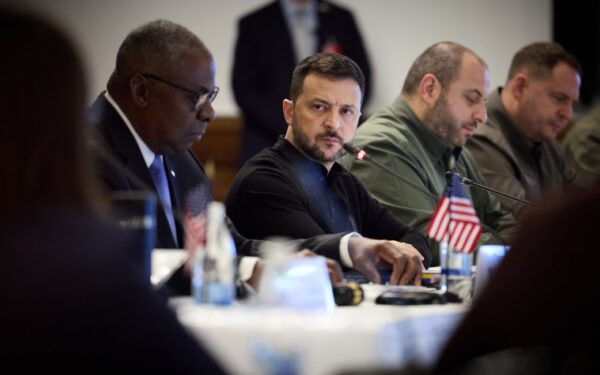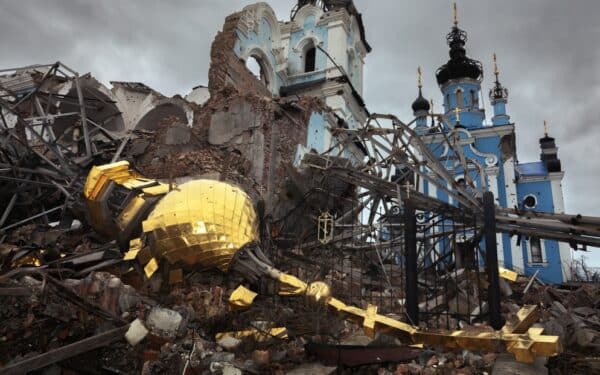With world leaders meeting in Washington at NATO’s 75th anniversary summit, China used the occasion to begin sea exercises near key Western allies in the Pacific. These war games come in the same week as China’s joint naval patrols with Russia and, in an unusual maiden venture, a joint “counterterrorism exercise” with Belarus less than five miles from the latter’s border with Poland – a daring encroachment on NATO’s backyard.
Such manoeuvres seem to validate the strongest-ever condemnation issued by the alliance’s 32 member states, which explicitly singled out and decried Beijing as a “decisive enabler” of Putin’s continued aggression in Ukraine, alluding to its sale of “dual-use” technology and purchase of (steeply discounted) Russian gas. Danny Russel, the former US assistant secretary of state for Asia, called the new wording “an extraordinary step”.
In addition, the communiqué drew attention to China’s rapidly expanding nuclear arsenal and space programme, while also accusing it of sustained and malicious cyber and hybrid activities.
Beijing has responded furiously to what it claims are “provocations, lies, incitement, and smears”. Lambasting NATO as “a relic of the Cold War” and for its “belligerent rhetoric”, China’s foreign ministry insisted that its position on Ukraine was to “promote peace talks and political settlement”. In an earlier statement, China’s mission to the EU claimed it had never provided lethal weapons to either side, while pointedly adding that its “normal trade flows” with Russia should not be subject to disruption or coercion.
China’s foreign ministry criticised what it termed NATO’s hypocrisy, saying it paraded as a regional defensive organisation while “continuously overstepping its boundaries” and “engaging in hegemonic bullying”. Following on from previous denunciations by top Chinese military officials about alleged US efforts to create an “Asian NATO”, Beijing warned the alliance to stay out of the Asia-Pacific, which it said was “not a wrestling ground for geopolitical competition”.
China is not entirely wrong about the increasing scope of NATO. Australia, Japan, New Zealand, and South Korea were all invited to Washington – a practice that started after Putin’s invasion of Ukraine in February 2022. Over the weekend, outgoing secretary general Jens Stoltenberg highlighted the alarm among pro-western nations in the Pacific at the growing alignment of Russia, North Korea, China, and Iran.
Accordingly, the summit communiqué also details plans to launch four projects in collaboration with Asia-Pacific partners to back Ukraine; strengthen cyber-defence cooperation; counter disinformation; and work on artificial intelligence. Such efforts align well with AUKUS – the trilateral security partnership between Australia, the UK, and the US – with many countries signalling their intent to join Pillar II and cooperate on advanced capabilities.
But while this intertwined threat may be strengthening and de facto expanding the alliance, it is also sowing divisions within the core. European NATO members in particular are split on the issue of China and how far to comply with America’s antagonism. Last week, president Erdogan indicated his interest in joining the Shanghai Cooperation Organisation, the security forum led by Beijing and Moscow as an alternative to the western order, just as Belarus became the newest addition.
Even more concerning, however, has been Hungary’s conspicuous cosying up with Russia and China. Since taking over the EU’s rotating six-month presidency, Prime Minister Viktor Orbán has attempted to thrust himself into efforts to end the Ukraine war. Severely irking EU and NATO allies, he engaged in a flurry of high-profile diplomacy by making unannounced trips to Kyiv followed by Moscow.
More recently, having built up friendly business and political ties with China over a number of years, Orbán landed in Beijing on Monday for a surprise “Peace mission 3.0”, where he praised his hosts as “an important stabilising force” and a “key power” for promoting peace by putting forward “a series of constructive and important initiatives”.
Speaking on the sidelines of the summit in Washington, Hungary’s foreign minister Peter Szijjarto stole the limelight by telling journalists Budapest neither wanted nor supported NATO becoming an “anti-China” bloc, exposing the fractures within the alliance.
With “Europe” and “the West” splitting amidst ominous shifts in the geopolitical tectonic plates, the world feels smaller and more claustrophobic and threatening.




